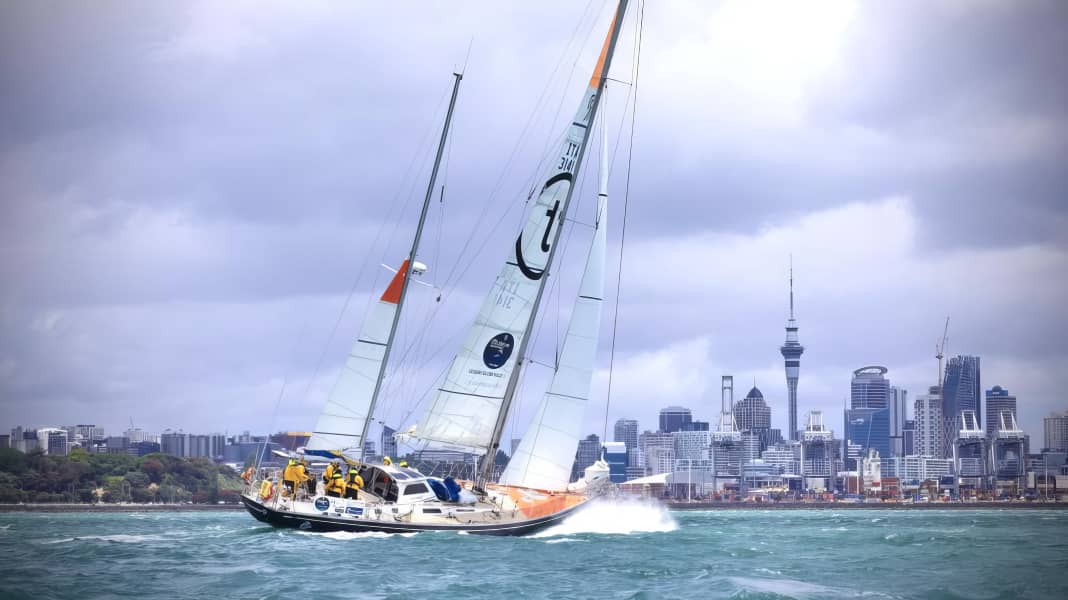Ocean Globe Race: Auckland is reached after more than 7000 nautical miles
Kristina Müller
· 14.12.2023

Skipper Vittorio Malingri was delighted with the ride across the Southern Ocean shortly after arrival:
"We haven't seen the sun for a fortnight! But we are so happy to be here. New Zealand is a fantastic country!"
His son Nico, also part of the crew, was also overwhelmed: "It feels so good to be here. Just fantastic. We didn't have any big storms, so we managed to push at the right time and keep a cool head when we needed to. The crew have done an amazing job."
The navigator on board the "Translated9" is Briton Simon Curwen, who skippered the field for a long time in the last Golden Globe Race. "The Indian Ocean was kind to us," he said immediately after arrival. "Lots of high pressure, no big systems, not too much breakage. We're now missing a spinnaker pole, which is broken in the centre, but otherwise the boat is in pretty good condition."
The "Translated 9" crew took the most southerly route in the fleet and had to take a more northerly course just for the third waypoint on the route to New Zealand. They fought a duel with the "Pen Duick VI" skippered by Marie Tabarly throughout the entire leg. Things got exciting when the Frenchwoman decided to sail through the Bass Strait between Tasmania and Australia.
For a short time it looked as if the risk had paid off. But the Italians had more favourable wind further south and were able to round Cape Reigna in the north of New Zealand first. Nevertheless, it remained a close race. "Pen Duick VI" reached Auckland just twelve hours after the victorious Italians. Skipper Marie Tabarly on the hardships of the 37-day leg:
"Because of the waypoint, we barely touched the Southern Ocean. We sailed north and then didn't have the right weather to sail south again, so we were forced to stay north. We were very frustrated."
Even after passing the Bass Strait, not everything went smoothly on board. Tabarly: "After we passed the Bass Strait, we sailed under spinnaker. We had had three weeks of very mild weather with no wind, so we were a bit lulled. But then the wind picked up very, very, very quickly, we lost control of the boat for a while and a lot of water came in. Yes, we have a lot of work to do."
"Spirit of Helsinki" takes the line honours
Less than three hours after Tabarly's crew, the Finnish swan "Spirit of Helsinki" crossed the finish line. The crew took the line honours on the stage to Cape Town and would also have hoped for more from the stroke over the Indian. Skipper Jussi Paavoseppä said about the second leg:
"Maybe we pushed a little too hard. Yes, it's nice to surf the boat at 18 knots, but then it's easy to make mistakes. And we made mistakes that cost us a lot. I don't even want to count how many times the mainsail was down - and in this race you don't want to have the mainsail down. I estimate that we lost a good 300 miles because we had to repair it."
The British "Maiden" was the fourth yacht to arrive. She took 39 days and four minutes. Skipper Heather Thomas was relieved: "I'm pretty tired, I'm not going to lie, the last 24 hours have been pretty challenging navigationally. So I've been awake for the last 24 hours because there's been so much going on. To be honest, the Southern Ocean was a bit tame. A lot of the girls were a bit disappointed with how tame it was. Hopefully next time we can offer them a bit more. The Tasman Sea was the roughest part. But I'm very happy to be here. New Zealand feels like home to me."
Seven more yachts have already passed Australia and are expected to reach the harbour in the next few days. The crews will be able to recover and repair their boats here until 14 January, when leg three to Punta del Este in Uruguay will start.
Sterna" and "Explorer" have only just logged a good half of the route. After the restart in Cape Town, the crews of both yachts had to sail back to South Africa to there to carry out essential repairs for the leg across the Southern Ocean. But even they can still make it to Auckland in time for the start of leg three of the Ocean Globe Race.
About the Ocean Globe Race
The Retro race around the world is taking place this year to mark the 50th anniversary of the 1973 Whitbread Round the World Race. On 10 September 2023, 14 crews set off from Southampton on the 27,000-mile voyage, which is divided into four stages and leads through the Southern Ocean and around the three large capes.
The stopovers are in Cape Town in South Africa, Auckland in New Zealand and Punta del Este in Uruguay, before the circumnavigation ends back in the UK in April 2024.

